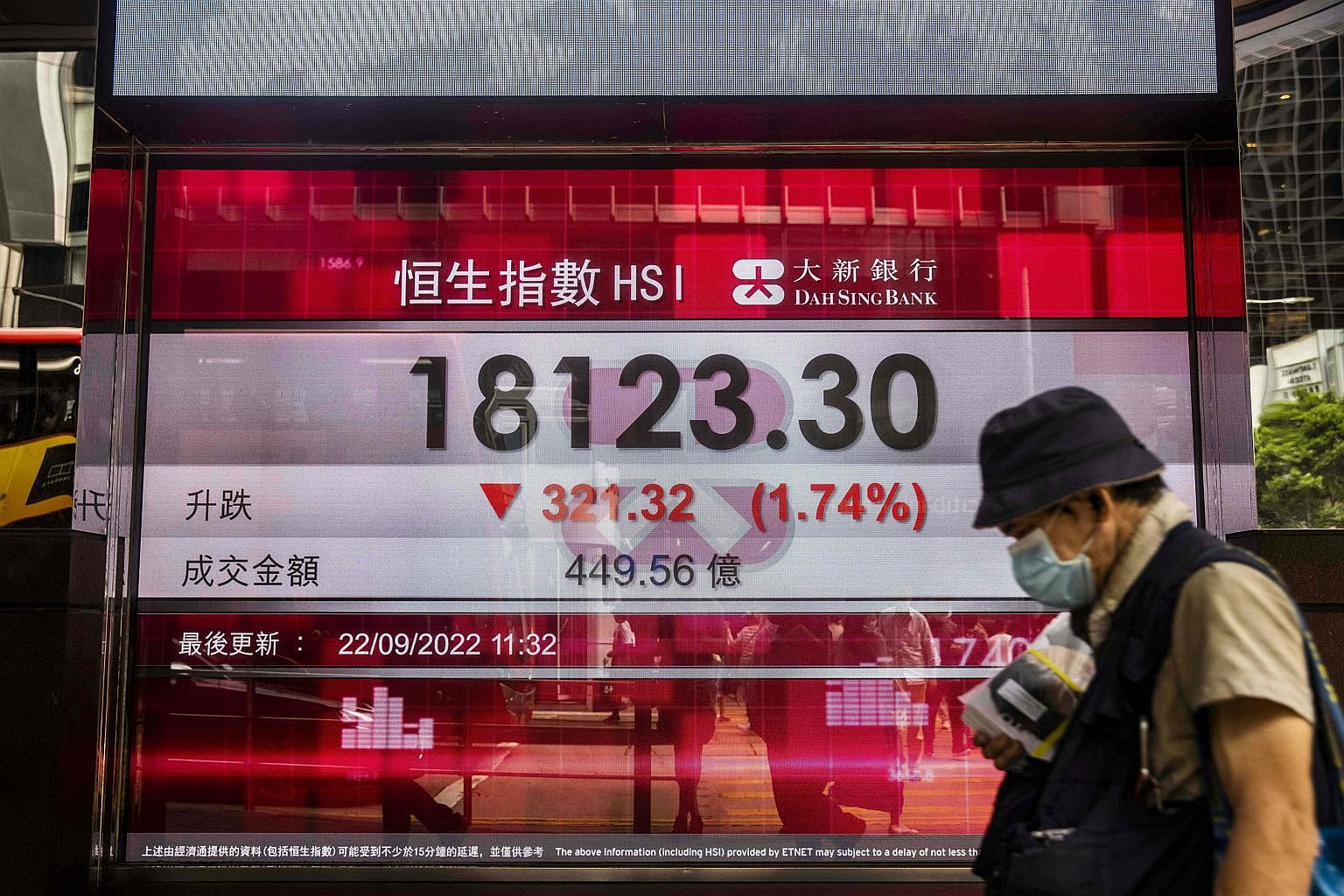Asia stocks slump on global slowdown fears after Fed signals more rate hikes ahead
Sign up now: Get ST's newsletters delivered to your inbox

Hong Kong was the hardest hit as the Hang Seng plunged as much as 2.6 per cent on Thursday.
PHOTO: AFP
Follow topic:
SINGAPORE - Asian stock markets slumped on Thursday amid heightened global slowdown fears after the US Federal Reserve signalled even more aggressive rate hikes ahead than investors had expected as it raised its key interest rate by a hefty 75 basis points for a third straight time.
Notably, Fed chairman Jerome Powell in comments on Wednesday vowed to "keep at it until the job is done" even at the risk of unemployment rising and growth slowing to a stall to fight inflation that has surged to the highest in 40 years in the United States.
The Straits Times Index dipped 0.28 per cent at the opening bell, but pared its losses to close up 0.04 per cent.
Regionwide, Hong Kong was the hardest hit as growing US-China tensions, China's slowdown and the Fed hike sent the Hang Seng plunging as much as 2.6 per cent on Thursday before closing 1.61 per cent lower.
Japan shed 0.58 per cent, Taiwan slipped 0.97 per cent and South Korea lost 0.63 per cent. Shanghai was down 0.27 per cent.
Wednesday's rate hike - the fifth this year - and a further escalation of the Russia-Ukraine war, sent the US dollar to a fresh two-decade high, fuelling concerns that investors could pull out of Asian equities and shift into US dollar-denominated assets.
Against the greenback, the Singapore dollar weakened slightly to 1.4182 as at 7.20pm on Thursday.
"If US dollar continues to strengthen and China doesn't open up soon, there will be more risk of a slowdown in Asia, and that could trigger more fund outflows from Asian emerging markets," Mr Shekhar Jaiswal, head of equity research at RHB Singapore, said.
"But Singapore will do slightly better because the Singdollar is strong relative to other Asian currencies. This is because the Monetary Authority of Singapore has been proactive in managing inflation by keeping the currency strong, which in turn makes SGD-denominated investments more attractive," he said.
The local stock market has seen more institutional fund flows in recent weeks as Singapore is expected to benefit from trade and capital flows resulting from the relocation of global supply chains to South-east Asia, Mr Chen Guang Zhi, head of research for KGI Securities, said.
Institutional investors have been net buyers of nearly $556.8 million worth of shares in the past two weeks, compared with during the first eight months of this year when they were net buyers of nearly $357.4 million worth of shares.
For the quarter to date, DBS, OCBC Bank, Singtel, Keppel Corp, Singapore Airlines, Venture, Ascendas Reit, Genting Singapore, Sembcorp Industries and Jardine Matheson have led net institutional inflows.
The three big banks, which make up about 40 per cent of the STI’s overall weightage, are a defensive play in a rising interest rate environment, even though all three counters closed in the red on Thursday.
DBS dipped 0.03 per cent to $33.52, UOB lost 0.5 per cent to $27.53. OCBC fell 0.3 per cent to $12.31.
CIMB economist Song Seng Wun see banks as beneficiaries of prolonged interest rate hikes, which will help boost their net interest income.
“The drag on the STI wasn’t as severe. While Asia’s growth has slowed, it is still stronger than global growth, and that has helped buffer Singapore. But if the US and other developed countries enter into recession, then Singapore cannot escape the downturn,” he said.
Mr Kelvin Tay, regional CIO, UBS Global Wealth Management, however, warned that “higher prospects of a hard landing in the US and a stagflationary European Union may not bode well for Singapore’s export-dependent economy, which may affect loan growth in the longer term”.
UOB senior economist Alvin Liew sees one more 75 basis point rate hike in November and a 50 basis point hike in December.
The median forecast is for the Fed funds rate to hit 4.4 per cent this year - higher than markets had expected and 100 basis points more than what the Fed projected three months ago.

